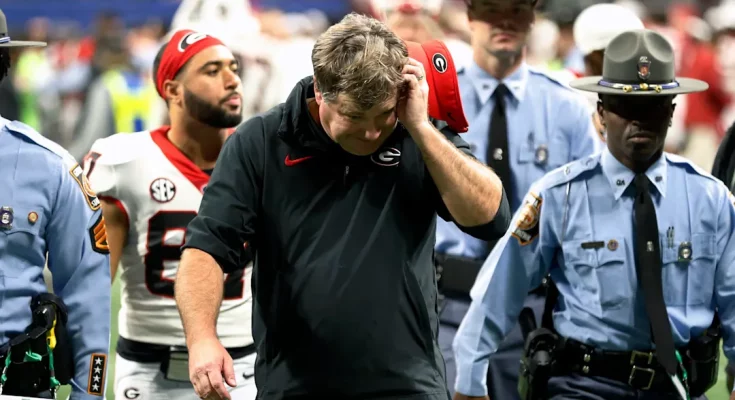Kirby Smart has built his reputation as one of college football’s most consistent and determined leaders, guiding the Georgia Bulldogs to sustained national prominence and setting a standard of excellence that rivals any program in the sport. Yet even for a coach who thrives on pressure and embraces the grind, the 2024 season presented obstacles that pushed him and his team to the edge in ways that went beyond the scoreboard. In candid reflections following the season’s conclusion, Smart admitted that this campaign was one of the most challenging of his coaching career, not just because of the physical toll of the games but because of the constant mental, emotional, and organizational battles the Bulldogs had to fight week after week.
Georgia entered 2024 with the weight of championship expectations heavy on its shoulders. The Bulldogs had become accustomed to being hunted, not the hunters, with every opponent circling their matchup on the calendar as the game to prove themselves. Smart knew that being the defending kings of the SEC and perennial College Football Playoff contenders meant his players had a target painted on their backs. What he didn’t anticipate was how grueling it would be to maintain peak performance through a season where the margin for error was razor-thin. Each week brought unique tests—injuries to key starters, unexpected roster shuffles, and the ever-present media storm that magnified every misstep.
One of the biggest hurdles was depth management. The Bulldogs had talent across the board, but the attrition rate in 2024 was unlike anything Smart had dealt with in recent years. Injuries struck both veterans and young rising stars, forcing the coaching staff to dig deep into the bench earlier than planned. Smart explained that while Georgia has done an exceptional job in recruiting elite talent, the developmental process is different when players are suddenly thrust into starting roles before they’ve fully adjusted to the speed and complexity of SEC football. The challenge became not just replacing production but also maintaining the team’s identity while adjusting to a rotating cast of contributors. That constant adaptation took its toll, requiring the staff to completely retool certain game plans midseason.
Off the field, the mental fatigue of the 2024 campaign loomed large. Smart pointed out that the mental side of the game often gets overlooked by fans, but it’s a critical part of sustained success. With players balancing academic demands, media scrutiny, and NIL obligations, the mental load was heavier than ever. For a program used to operating at maximum intensity, Smart realized that part of his job this season was to prevent burnout. That meant altering practice routines, incorporating more recovery periods, and spending extra time on team-building exercises to maintain chemistry despite the external noise. While these adjustments paid dividends in keeping the group together, they also required breaking from the program’s traditional blueprint, which was not an easy decision for a coach who thrives on structure and discipline.
Then there was the issue of leadership transition within the locker room. Georgia had lost several vocal leaders to the NFL after the 2023 season, and while the new captains embraced their roles, the dynamic was different. Smart emphasized that leadership isn’t something that can be simply appointed—it has to develop organically. Early in the season, the team struggled to find its emotional heartbeat, and Smart acknowledged that it took time for the 2024 group to develop the collective grit and accountability that had defined previous championship teams. The turning point came midseason, when players began holding each other to higher standards without relying solely on the coaching staff. That internal shift helped stabilize the season, but it was born out of trial by fire.
From a purely competitive standpoint, the schedule itself was brutal. The Bulldogs faced one of the toughest slates in recent memory, with road games in hostile SEC environments and non-conference matchups against nationally ranked opponents. The grind of traveling, preparing for high-caliber opponents each week, and dealing with the physicality of SEC play made for a season where there was little room to catch their breath. Smart admitted that even with Georgia’s elite conditioning program, the players and coaches were worn down at times. That fatigue was compounded by the fact that every opponent seemed to play their best game against Georgia, knowing that upsetting the Bulldogs would be a season-defining achievement.
Despite all of these obstacles, Smart stressed that the adversity of 2024 will ultimately make the program stronger. He framed the season as a reminder that even dynasties must evolve to survive. The Bulldogs may not have had the same smooth dominance as in previous years, but the resilience and adaptability they developed will serve as a foundation for future success. Smart pointed to younger players who gained invaluable experience, coaches who learned to be more flexible, and a team culture that was tested but never fractured. These, he said, were the quiet victories that may not show up in the record books but will be felt in seasons to come.
Smart’s reflections also revealed a personal side of coaching that often goes unnoticed. As much as he is a tactician and motivator, he is also a mentor who shoulders the emotional weight of his players’ experiences. He spoke about late-night conversations with players struggling with confidence, balancing the competitive drive to push them harder with the compassion to understand their challenges. He admitted that he spent more time than ever this year focusing on mental health and personal growth, seeing firsthand how crucial it is to build not just better athletes but better young men.
The 2024 season tested Georgia in every conceivable way—on the field, in the film room, and in the locker room. It required a level of perseverance and unity that could only be forged through hardship. For Smart, the difficulty lay not only in managing the X’s and O’s but in navigating the emotional currents of a long, draining campaign where expectations were sky-high and the margin for error was small. Yet in true Bulldog fashion, they met those challenges head-on, emerging from the year not defeated, but more determined.
In the end, Kirby Smart didn’t shy away from calling 2024 one of the toughest seasons of his coaching career. But he also made it clear that he wouldn’t trade the lessons learned for anything. Seasons like this, he said, are where champions are truly built—not when everything goes right, but when everything seems to go wrong and the team finds a way to keep moving forward. For the Georgia Bulldogs, the story of 2024 will be remembered not just for the wins and losses, but for the grit, adaptation, and relentless belief that carried them through.



